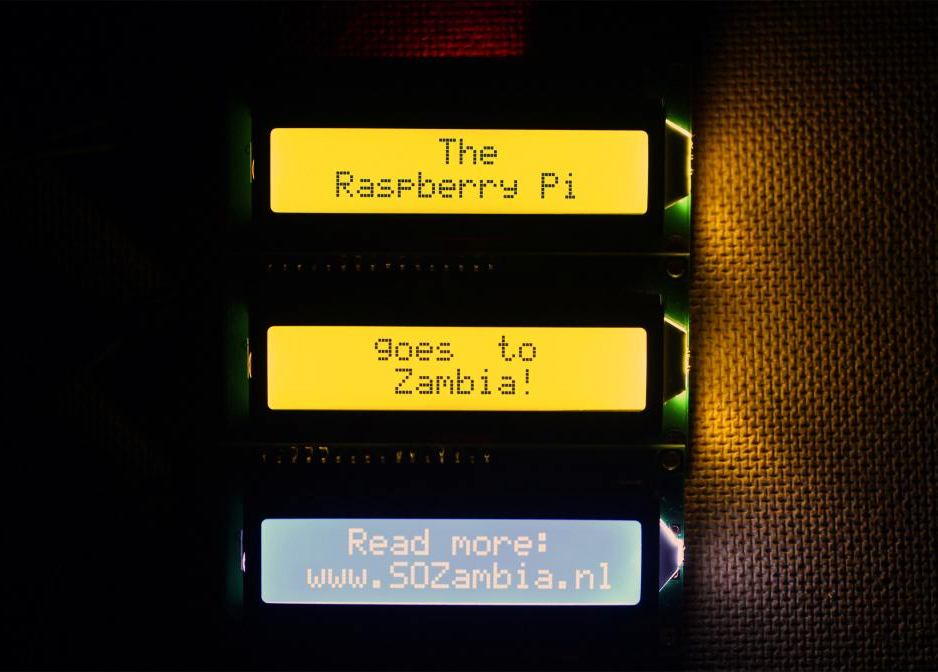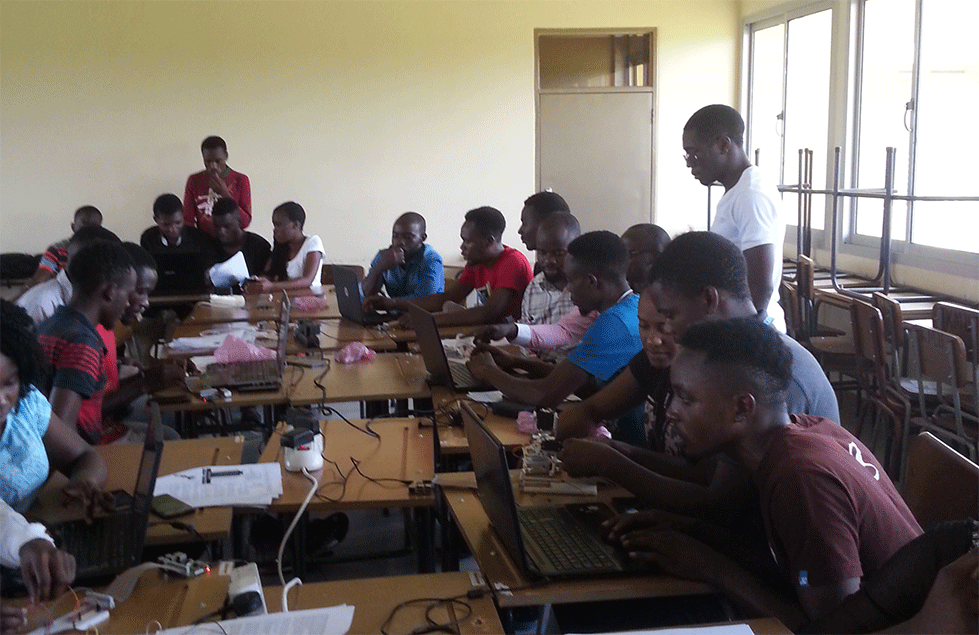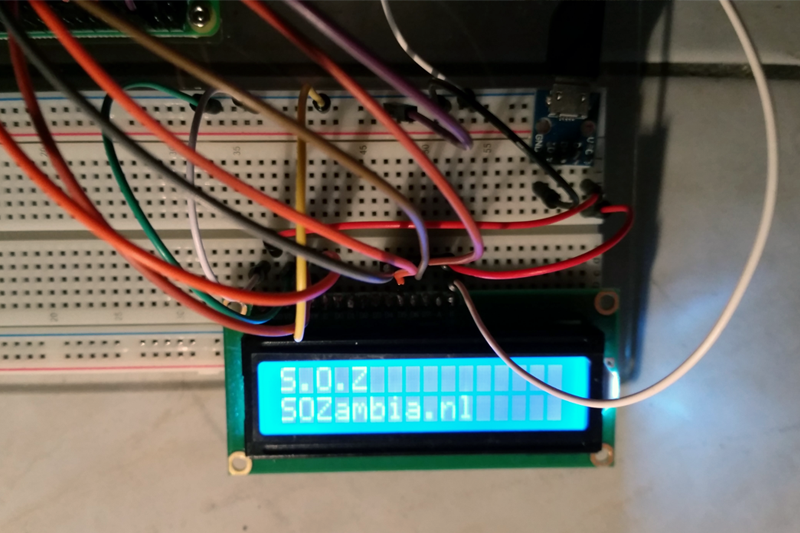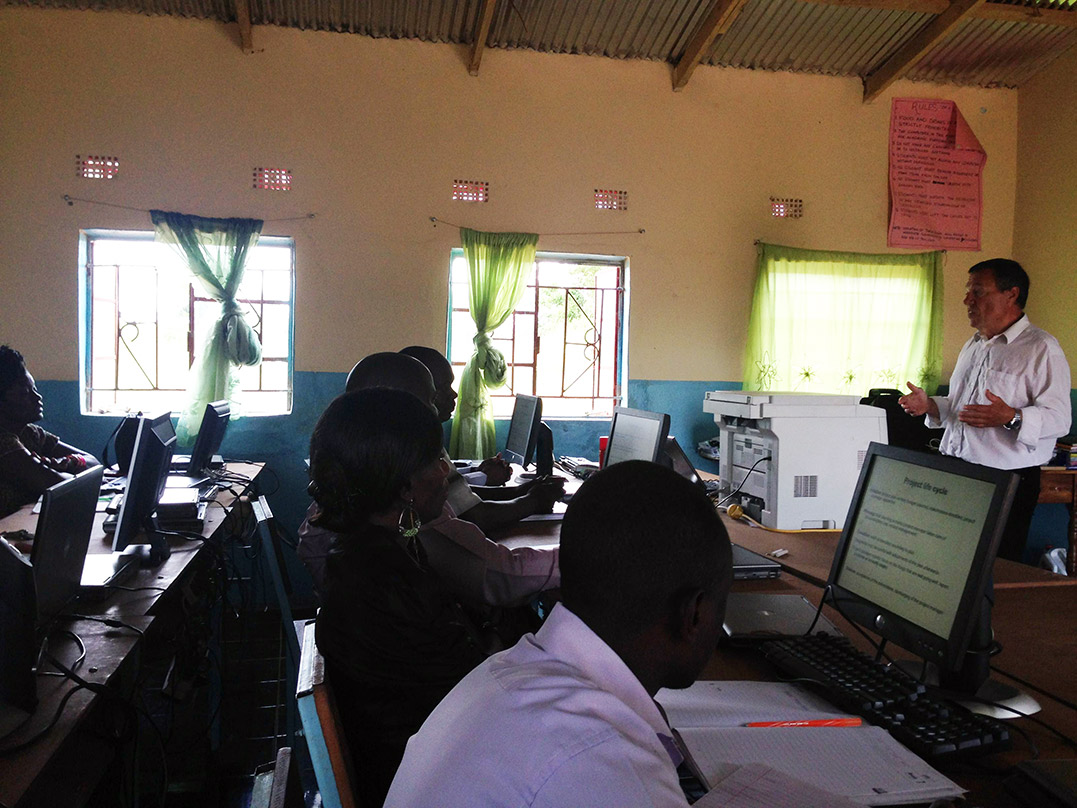The CiTA project has been revived since this year. CiTA stands for Computers in Technical Applications and focuses, as the name suggests, on applications of computers in all kinds of equipment. Examples include measuring temperature and humidity or controlling a traffic light or a motor in a robot arm.
Technology will never replace great teachers, but
technology in the hands of great teachers is transformational.
-George Couros
The use of computers has been part of the secondary school curriculum in Zambia for some years now. Like in may countries the emphasis lies on 'computer literacy' and administrative applications like text editing and spreadsheets. Important, but is it enough?
More and more schools answer this question with: no, this is not enough. Also programming computers is important for the future generations. Not because the writing of code itself is so important but because programming develops the ability to analyze complex problems and split them up in components in which standard structures are recognized. Apart from that it is important that students are aware of the role computers play in physical reality. An example: a computer controls the traffic lights at a complex crossing; it needs certain input signals for that task and the software structure is based on a loop structure in which decisions are made based on the inputs. Or, more advanced but becoming more and more common, the control of a robot by a computer.
Within the project 'Computers in Technical Applications' - CiTA - students are given the opportunity to get familiar with technical applications based on computers. The original goal was the introduction of 'playing with technology' in secondary schools. By means of workshops and activities in a club context, equipment and knowledge should come within the reach of students with a technical interest. It succeeded in itself, but continuity was a problem. There are always enthusiastic teachers to find but the course is great. And then suddenly the students are unaccompanied. For these and other reasons, workshops will be held from 2019 at two universities with the aim of structurally including the subject in the curriculum. By means of holiday courses and support from teachers, the knowledge can be built up and maintained in secondary schools. In particular, the variant in which university students propagate knowledge on expenses is considered promising.
Three lab programs have been developed within the CiTA project:
- part 1 – sensors and actuators
- part 2 – Image Processing and Artificial Intelligence
- part 3 – Internet of Things
The labs are based on the Raspberry Pi and focus on the application of Artificial Intelligence and Internet of Things in the engineering environment. The first lab (Sensors and Actuators) gives an introduction on as well the Raspberry Pi and its programming environment as some of the important interfaces with the physical environment.
The labs are in the process of being implemented in the curricula of three universities.
Handouts are available under ´Documents´. All material that has been developed within the CiTA project can be used free of charge for educational and non-commercial purposes, provided that the source is acknowledged. A reference to the nature of our project and correspondence about the application and evaluation of the results are appreciated.
 Donate: Do you still have an old computer?
Donate: Do you still have an old computer?
We are constantly looking for used computers and accessories for our CiTA project. Do you have something usefull that is not used anymore? Or maybe the computers at work are being replaced? We would like to hear about it and welcome a message through our contact page!
Nieuws
CiTA update
The curriculum
As part of the CiTA project, SOZ tries to contribute to the innovation of the curriculum at various levels of education. Currently, the focus is on the university level. Developments such as the introduction of Artificial Intelligence and, in conjunction with that, the introduction of intelligent devices, are going to have their impact on Zambian industry like everywhere else. And although Zambian industry is unlikely to play a significant role in the development and production of such equipment any time soon, choices regarding procurement will have to be made in the future by the students currently attending higher education.
Microcomputers in Technical Applications - part 3
Handout - Microcomputers in Technical Applications, part 3 Internet Of Things
Microcomputers in Technical Applications - part 1
Handout - Microcomputers in Technical Applications, part 1: Sensors and actuators
Integration of computers in equipment and industrial processes
This year and next year the focus within the CiTA project will be the introduction and further implementation in the curriculum of the integration of computers in equipment and industrial processes. The curriculum innovation will take place within three universities: the University of Nairobi (department of Electronic Engineering), the University of Zambia (department of Electronic Engineering and departments in application areas) and the Kapassa Makassa University in the north of Zambia (department of Science and ICT in Education).
Artificial intelligence in engineering
Exploration of AI within the curriculum
Integration of computers in equipment and industrial processes
This year and next year the focus within the CiTA project will be the introduction and further implementation in the curriculum of the integration of computers in equipment and industrial processes. The curriculum innovation will take place within three universities: the University of Nairobi (department of Electronic Engineering), the University of Zambia (department of Electronic Engineering and departments in application areas) and the Kapassa Makassa University in the north of Zambia (department of Science and ICT in Education).
Technological education
The objective of the CiTA project is to give pupils and student an opportunity to get in touch with technique and engineering. And when we say engineering these days we mean electrical and mechanical devices controlled by (simple) computers. These devices can vary from all kind of sensors to simple mechanical devices like moving robot arms. That sounds like a substantial investment but prices in this area have dropped tremendously during the last few years: since computers are usually already available in Secondary Schools, a complete laboratory set for two students can be made available for between 50 and 100 euro (between 60 and 120 dollar). And most of the students are really eager to experiment with this equipment. However, some guidance and support will always be needed at this level, even for the most motivated students and even when detailed handouts are available. And this is just the problem in many Secondary Schools. Staff is often not familiar with the topic and, if they are, there is a good chance they leave to industry. That is to a large extend why the recent introduction at two schools did not have the success that was hoped for.
Manual; Raspberry Pi intro
Handout from the RP3 course 2019
PiVoT & CiTA; an update
Two years ago the CiTA — Computers in Technical Applications — project started. The aim of this project is to let the students gain knowledge in controlling equipment using computers. In that way they become familiar with a variety of sensors and actuators — and the underlying physical principles — as well as with the development of software for the communication of the computer with the ' surrounding world '. Writing software trains the student in analyzing technical problems and stimulates logical thinking.
Manual; Raspberry Pi intro
Handout from the RP3 course 2018
Combine the practical with the pleasurable
We were asked by the University of Nairobi to give the workshop that had been developed for Zambia also there. We were pleased to grant this request even though strictly speaking it was outside the objectives of the Foundation. In 2018 the first two workshops were given for 16 students at Master and Phd level. The workshops were very successful and will be repeated for a group of 32 students in 2019. The handout, as well as the powerpoint presentation of the lecture on robots and artificial intelligence, are available from this site.
Introducing the Raspberry Pi
The CiTA project started with two workshops (one at Kalwala Secondary School and one at Chadiza Boarding Secondary School) based on the Raspberry Pi computer. The picture above shows three displays with two lines of 16 characters. During the workshop the participants connected the displays to the Raspberry Pi computers and they developed the software for displaying the text. Other experiments involved the connection and programing of LED s, switches, small motors, speakers, etc.




